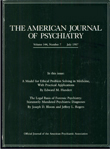Neuroendocrine Evidence That Clozapine's Serotonergic Antagonism Is Relevant to Its Efficacy in Treating Hallucinations and Other Positive Schizophrenic Symptoms
Abstract
OBJECTIVE: The authors examined the effect of prolonged clozapine treatment on central serotonergic (5-HT) function in schizophrenia. METHOD: Prolactin responses to the 5-HT releasing agent d-fenfluramine were measured in two groups of 10 schizophrenic subjects. The first group was tested twice, before and after a mean of 10 weeks of clozapine treatment. The second group was tested after a mean of 20 months of clozapine treatment. RESULTS: The prolactin response was significantly blunted in these 20 patients treated with clozapine. There was a significant positive correlation between d-fenfluramine-evoked prolactin release and the overall positive symptom score and the hallucination and delusion subscores of the Scale for the Assessment of Positive Symptoms. CONCLUSIONS: Blunted 5-HT-mediated prolactin responses in schizophrenic patients receiving clozapine monotherapy for up to 20 months were correlated with reductions in positive symptoms. This suggests that 5-HT antagonism is relevant to clozapine's efficacy in alleviating hallucinations and other positive schizophrenic symptoms.



